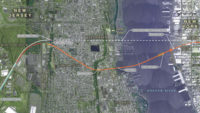A joint venture of Barnard Construction Co. Inc., Bozeman, Mont., and Judlau Contracting Inc., College Point, N.Y., edged out two other prequalified teams to win a $583-million contract to bore a pair of 16,500-ft-long, 27-ft-dia., tunnels averaging 120-ft deep for the Manhattan portion of an $8.7-billion second mass-transit tunnel linking New York's Pennsylvania Station to New Jersey. Directors of project owner, New Jersey Transit, unanimously approved the contract on Dec. 9.
Proposals for a related tunnel contract under New Jersey's Palisades rock formation, estimated at $250 million, will be due Dec. 15, says a New Jersey Transit spokesman They are the first two of three major tunneling contracts for the Mass Transit Tunnel project, set to be the nation's largest mass transit public works project, that will be overseen also by the Port Authority of New York and New Jersey.
Construction will begin early next year, and is expected to continue through late 2013. The team could earn up to $50,000/day for early completion of certain milestones, with equivalent potential liquidated damages, says Paul Wyckoff, New Jersey Transit spokesman. The entire project is scheduled to be completed by 2017 and will add two rail lines into New York from New Jersey, set to more than double the number of trains during peak commute times, from 23 to 48. The agency has estimated overall ridership into Manhattan could be boosted from 85,000 per day to 127,500.
The Barnard-Judlau team bested proposals submitted by two other groups, ARC Constructors, a Pearl River, N.Y.-based joint venture of S.A. Healy, CCA Civil and Halmar International; and a Secaucus, N.J.-based joint venture of Schiavone Construction Co., Skanska Civil and J.F. Shea.
Those three teams and an additional joint venture of OHL USA Inc., Davie, Fla., and Tully Construction Co., Flushing, N.Y., were prequalified on Aug.28 to proceed for the Palisades Tunnels contract (ENR 10/19, p. 10). The scope includes twin bored tunnels, 5,200 ft long, running through the Palisades rock formation to an access shaft in Hoboken.
Prequalification for a third and final design-build contract, estimated at $500 million and called the Hudson Tunnel contract, is now under way.Pre-qual questionnaires are due to New Jersey Transit by Dec. 22 with final proposals due next September, according to the project website. is to begin later this year. It will involve construction of 14,600 of soft-ground tunnels about 110 ft beneath the river.
The project has generated controvery, with opponents charging that it is too costly at a time when the state faces a projected $1 billion budget gap.
Gov. Jon Corzine (D), who lost a re-election bid last month to Republican Chris Christie, said that part of the state's nearly depleted Transportation Trust Fund will be used but that those moneys would be repaid by future federal funds. "There have always been pros and cons expressed about this,"
Corzine says. "The point is making sure we have the will and the resources to build a massively important contributor to improving the quality of life in the metro region and certainly for the state of New Jersey."
About $6 billion of the cost of the project will be split by the Port Authority of New York and New Jersey and federal mass transit funds, says Wyckoff. The rest will come from a different federal clean-air program and from $1.25 billion in existing toll hikes already approved by the New Jersey Turnpike Authority, he said.
Judlau is involved in several transportation projects in New York, including a tunnel to connect the Long Island Railroad to Grand Central Terminal and restoring the lower deck of the Henry Hudson Bridge on the west side of the city. Barnard has been involved in water and sewer pipeline projects in Nevada, Washington, Colorado, California as well as projects building oil and gas pipelines, dams and reservoirs.
They will start at Manhattan's western edge 120 feet below the surface and bore to the northeast to an expansion of Penn Station between Sixth and Eighth avenues. The two tunnels will split into four as they approach the station at 34th Street.



Post a comment to this article
Report Abusive Comment